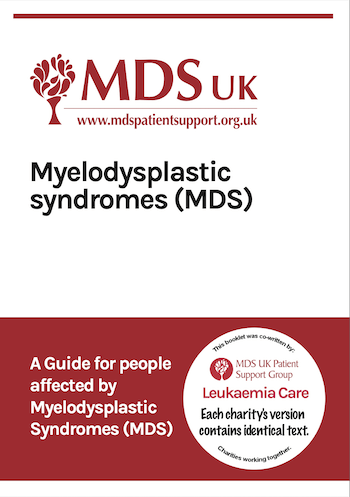What is MDS?
Myelodysplastic Syndromes: a group of malignant blood disorders
MDS stands for Myelodysplastic Syndromes, and it is a group of malignant blood disorders in which the bone marrow fails to produce healthy blood cells.
All types of blood cells can be affected, causing a range of symptoms.
- Red cells (also called erythrocytes) – which carry oxygen to organs and tissues in the body.
- White cells – which collectively fight against infection.
- Platelets (also called thrombocytes) – which prevent us from bruising and bleeding.
What does Myelodysplastic Syndromes mean?
Myelo means bone marrow
Dysplastic means strangely- or abnormally-shaped
Then, the word Myelodysplastic refers to the malfunction of the bone marrow in producing the correct quality of blood cells.
Is MDS Cancer?
MDS is a form of bone marrow cancer, although its progression into leukaemia does not always occur. The failure of the bone marrow to produce mature healthy cells is a gradual process, and therefore MDS is not necessarily a terminal disease. In some patients, however, MDS can progress to AML, Acute Myeloid Leukaemia. In AML, abnormal cells grow very rapidly, building up in the bone marrow and blood.
MDS Guide: Support & Information for Patients & Care-givers
New MDS Guide (2024)
A downloadable comprehensive MDS Guide for patients, families and care-givers which describes the various types of MDS, diagnosis, treatment and more. Co-written by the MDS UK Patient Support Group and Leukaemia Care, this guide is a brand new edition (April 2024).
If you'd prefer a hard copy, email us at admin1@mdspatientsupport.org.uk and we'll be happy to post one out to you.
Understanding MDS
Other materials: Presentation by Dr. Ana Carvalhosa
Understanding Blood, Bone Marrow and MDS
This presentation will help you understand more about the bone marrow, the blood and how they are affected in MDS.
Understanding Myelodysplastic Syndromes
What are MDS Early Signs and Symptoms?
A person with MDS will suffer from chronic tiredness and weakness due to the low levels of haemoglobin in the red blood cells, which carries oxygen to the body.
This is debilitating in itself and often requires regular blood transfusions. Transfusions are time consuming and restrictive.
In MDS, platelet numbers, which prevent bleeding and bruising, can often be very low. This can result in spontaneous bleeding and bruising.
If an injury is sustained blood loss may be excessive. Clearly these factors result in many constraints and difficulties. Platelet transfusions may be required on a regular basis.
When white cells numbers become very low (as they often do in MDS) the body is unable to fight off infection normally. This results in a greater than usual incidence of infections which take longer than usual to clear and might require hospitalisation. White cells cannot be given by transfusion.
Learn more about the symptoms of MDS
How is MDS Treated?
There are a number of options to treat MDS. Treatment decisions are based on the International Prognostic Scoring System (IPSS-R).
The only cure is a bone marrow transplant for those patients who are fit enough and who have a suitable donor. Recovery may take months or even years and during this time the patient has to be monitored regularly and where necessary, be supported with transfusions.
Learn more about MDS treatment options
What is the Prognosis for an MDS Patient?
Prognosis means the expected outcome or survival from MDS. Your prognosis depends on many factors including those not related to MDS, such as your general fitness and age. Because each person is unique, and each person’s disease is different, a prognosis can be difficult to make. Also, how a disease progresses over time is unpredictable.
However, to allow your doctor to make the right treatment choices, MDS doctors and scientists around the world have designed a number of systems by which we can score how your MDS is likely to behave.
MDS UK Patient Support Group: Support, Information, Awareness & Campaigns for those affected by Myelodysplastic Syndromes
For any queries and assistance – call our main London office Mon-Fri:
Tel: 020 7733 7558


